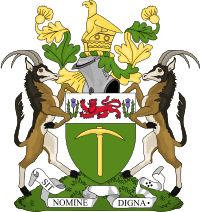William Harper (Rhodesian politician)
| William Harper | |
|---|---|
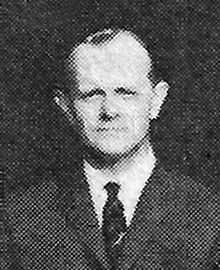 | |
| Harper in 1968 | |
| Personal details | |
| Born | William John Harper 22 July 1916 Calcutta, Bengal Presidency, British India[1] |
| Political party |
|
| Spouse(s) | Elizabeth[2] |
| Military service | |
| Allegiance | |
| Service/branch | |
| Years of service | 1937–49 |
| Rank | Wing Commander |
| Battles/wars | Second World War |
William John Harper (born 22 July 1916) was an Indian-born politician, general contractor and fighter pilot who served as a Cabinet minister in Rhodesia (or Southern Rhodesia) between 1962 and 1968, and signed that country's Unilateral Declaration of Independence (UDI) from Britain in 1965. Born in Calcutta, the son of an old and prominent Anglo-Indian merchant family, he joined the Royal Air Force in 1937 and served as an officer throughout the Second World War, fighting in the Battle of Britain, south-east Asia, India and North Africa. He was appalled by Britain's granting of independence to India in 1947, and emigrated to Rhodesia on retiring from the air force with the rank of wing commander two years later.
Harper contended that British rule in the subcontinent should never have ended, and took a similar stance on his adopted homeland, reportedly declaring that it, South Africa and the neighbouring Portuguese territories would "be under white rule forever".[3] He entered politics with the Dominion Party in 1958 and became Minister of Water Development and Roads in the Rhodesian Front (RF) government in 1962. The head of a far-right group within the RF, he called for Rhodesia to abolish black representation in parliament and adopt South African-style apartheid. He became one of the main agitators within the government for a UDI if Britain would not grant independence with white Rhodesians still in control.
When Prime Minister Winston Field resigned in 1964, Harper was a front-runner to succeed him, but lost out to Ian Smith, who moved him to the Ministry of Internal Affairs. Each breakdown or setback during the early years of Smith's premiership prompted press speculation that Harper might replace him. Observers in the United Kingdom, including the Prime Minister Harold Wilson, perceived Harper's rightist faction to wield considerable influence over Smith's decision-making in the period before and directly following UDI, a view shared by Harper himself. In 1966, when Smith brought a working document back from the HMS Tiger talks with Wilson, Harper led opposition to the terms in Cabinet, contributing to their rejection.
Harper resigned from the Rhodesian Front in July 1968, soon after Smith dismissed him from the Cabinet, reportedly because Harper had had an extramarital affair with a British agent. He subsequently became a vocal critic of the Prime Minister, greeting each step Smith made towards settlement with black nationalists during the Bush War with public indignation. Harper returned to politics in 1974, when he set up the United Conservative Party to oppose Smith in that year's election, but his party failed to win a seat. By the time majority rule began in Zimbabwe Rhodesia in 1979, following the Internal Settlement of the previous year, Harper had left for South Africa.
Early life and military service

Harper was born on 22 July 1916 in Calcutta, British India,[1] scion of an old and prominent Anglo-Indian merchant family that had been based in the subcontinent for generations, working with the East India Company during the 18th and 19th centuries.[4] He grew into a short but tough man who spoke with clipped diction. Nathan Shamuyarira wrote of him in 1966 that "his tight mouth rarely relaxes into a smile, so ... he seems always on the point of losing his temper".[4]
Harper joined the Royal Air Force (RAF) in 1937, and was commissioned with the rank of acting pilot officer on 5 September.[5] After war broke out in 1939 he was promoted to flying officer on 12 February 1940;[6] he received the war substantive rank of flight lieutenant exactly a year later.[7] During 1940 he was one of "The Few"—the Allied pilots of the Battle of Britain, in which he flew with No. 17 Squadron.[8] He was seconded to the Royal Australian Air Force (RAAF) in September 1941 to command No. 453 Squadron RAAF, a fighter squadron then based at Singapore. No. 453 Squadron suffered high losses during the Japanese invasion of Malaya in December 1941 and January 1942, and was disbanded in Australia in March 1942. Harper then commanded No. 135 Squadron RAF in India from April 1942. In January 1943 he took command of No. 92 (East India) Squadron RAF in North Africa,[1] and received the rank of temporary squadron leader.[9] He was transferred to England in September 1943 and commanded the University Air Squadron at Leeds until 1944. He remained with the RAF following the end of hostilities.[1]
Harper was appalled when Britain made India independent in 1947; he believed that the British government had unnecessarily caved in to Indian nationalist demands and should have continued ruling India indefinitely. He retained this view for years afterwards.[4] He retired from the RAF in April 1949, keeping the rank of wing commander.[10] The same year he emigrated to Southern Rhodesia, a British colony in southern Africa that had been self-governing since 1923, and settled in Gatooma, where he farmed, mined and set up an earth-moving contractor's business.[11]
Political career
Dominion Party
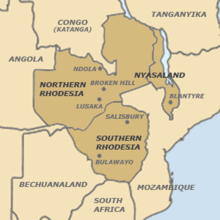
Harper entered politics when he contested the Gatooma seat in the 1958 general election, running for the opposition Dominion Party (which called for full dominion status), and won with 717 out of 1,300 votes.[12] Holding strongly conservative views, he soon became seen as the voice of the party's right wing. He was elected president of the Dominion Party's Southern Rhodesian arm in October 1959, and by 1960 he was the official Leader of the Opposition in the Southern Rhodesian parliament.[13]
Amid decolonisation and the Wind of Change, the Federation with Northern Rhodesia and Nyasaland was looking ever more tenuous, and the idea of "no independence before majority rule" was gaining considerable ground in British political circles. Harper called for Southern Rhodesia to abandon the Federation and "go it alone".[13] When black nationalist riots broke out in the townships in October 1960, he condemned Prime Minister Sir Edgar Whitehead and the governing United Federal Party (UFP) as too lenient on the protesters, and argued that giving concessions following political violence would make black Rhodesians believe that "trouble pays dividends".[14]
Rhodesian Front
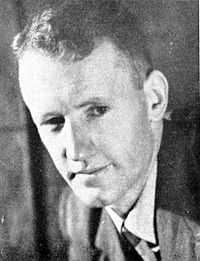
In 1962 Harper was a founder member of the Rhodesian Front (RF), an alliance of conservative voices centred around the former Dominion Party and defectors from the UFP. The party's declared goal was independence without radical constitutional change and without any set timetable for the introduction of majority rule. After the RF won a surprise victory in the November 1962 general election—Harper comfortably retained his seat in Gatooma[15]—the new Prime Minister Winston Field made him Minister of Water Development and Roads in the new government.[16] Over the next few years, Harper became one of the main agitators in the Cabinet for a unilateral declaration of independence (UDI); equating Southern Rhodesia to India, he saw this as a way to prevent a repeat of "the same mistake".[4]
When the RF grew dissatisfied with Field during late 1963 and early 1964 because of his failure to win independence from Britain on Federal dissolution, Harper was one of two frontrunners to replace him; the other was the Deputy Prime Minister Ian Smith, formerly of the UFP, who was also Minister of the Treasury. Harper, described in The Spectator as "an ambitious politician and single-minded upholder of white supremacy", was generally considered the more radical choice, and the man more likely to go through with UDI.[17] When the Cabinet forced Field to resign in April 1964, it was Smith who was nominated by the ministers to become the new Prime Minister. Accepting the premiership, Smith reshuffled the Cabinet a few days later, moving Harper to the Ministry of Internal Affairs.[18] Harper was deeply disappointed not to have succeeded Field.[19]
As Minister of Internal Affairs, Harper oversaw the indaba (conference) of chiefs and headmen at Domboshawa in October 1964, at the end of which the tribal leaders unanimously announced their support of the government's line on independence.[20] He continued to be linked with the premiership. During Smith's negotiations with the British government, each breakdown or setback was accompanied by speculation in Rhodesia ("Southern" was dropped in late 1964) that Harper might step up to take his place.[21] As the dispute with Britain intensified and white Rhodesians clamoured for independence, Harry Franklin reported in The Spectator in August 1965 that if Smith proved unwilling to go through with UDI, "it is widely believed that ... Harper will emerge from the wings, no longer an understudy, to dare what Mr Smith dare not".[22] Harper was one of four ministers chosen by Smith to accompany him to London for talks in October 1965; the others were John Wrathall (Finance), Desmond Lardner-Burke (Justice) and the Deputy Minister of Information, P K van der Byl.[23] Agreement was not reached, and a month later, on 11 November 1965, Smith and his Cabinet declared Rhodesia independent.[24]
At the time of UDI, Harper reportedly kept a map of southern Africa on the wall of his office, on which he had coloured South Africa, South-West Africa, Rhodesia, Mozambique south of the Zambezi and Angola red; he told visitors that "the red area will be under white rule forever".[3] He insisted that Rhodesia would continue regardless of the international condemnation that had greeted UDI, and publicly demonised the UK government, describing it in January 1966 as "an enemy ... [that] must be brought down".[25] He also vilified black nationalist guerrilla fighters opposed to the Rhodesian government, calling them "gangs of terrorists" and "criminals".[26] Comments such as these helped to cement Harper's reputation as a hardline right-winger and rival to Smith's leadership.[26][27] The strong personalities of Harper and other ministers such as the Duke of Montrose (generally known in Rhodesia by his former title Lord Graham) were perceived by the British Prime Minister Harold Wilson and his compatriots as a great influence on Smith's political decision-making, an opinion also expressed by Harper himself.[28]
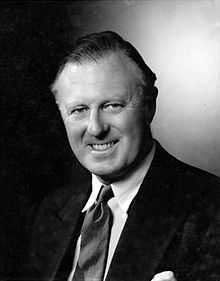
While Harper was considered an intelligent and capable minister by peers and reporters—a 1965 report in The Economist called him "by far the best brain" in the Rhodesian Cabinet[29]—his views were often perceived as overly radical.[27] He led a phalanx of far-right voices within the RF calling for the introduction of South African-style apartheid in Rhodesia,[30] and while the party line was gradual advancement of black political representation, Harper called not only for the cessation of such moves, but for the abolishment of black MPs altogether.[28] He thus became something of an obstacle to an Anglo-Rhodesian settlement. Indeed, when Smith brought a working document back from the HMS Tiger talks with Wilson in October 1966, it was Harper who led opposition to the terms in Cabinet, contributing to its ultimate rejection.[28] Harper considered himself to have been overlooked when Smith gave the office of Deputy Prime Minister (which had been absent since UDI) to the more moderate Wrathall the month before the Tiger conference. The South African newspaper Die Beeld reported in December 1966 that the RF's right wing was poised to oust Smith in favour of Harper,[31] but this did not occur.[28]
Resignation
On 4 July 1968, Harper resigned from the Cabinet at Smith's request. He was the first minister to be dismissed during Smith's premiership.[28] The government released a statement explaining that Harper had been removed "for reasons entirely unrelated to differences of opinion over constitutional or other political issues",[28] and saying simply that Harper had been deemed "a security risk". Harper publicly claimed that he had been fired for political reasons and because of the threat he posed to Smith's leadership.[32] Smith was reticent but told reporters he was prepared to tell "the whole sorry tale" if Harper wished.[32]
According to the memoirs of Ken Flower, then the director of Rhodesia's Central Intelligence Organisation (CIO), Harper's downfall was the result of an extramarital affair with a young secretary in the Rhodesian civil service who was discovered by the CIO to be an agent for British intelligence.[33] Flower informed Smith of this on 3 July and the Prime Minister demanded Harper's resignation that afternoon; Harper acquiesced the next day. Because this was kept secret (presuming it is true), Harper's sudden departure from the Cabinet was interpreted by many observers at the time as the culmination of the personal and political rivalry between Smith and Harper, or the result of disagreements over what should be in the new constitution.[28]
Harper officially resigned his parliament seat and left the Rhodesian Front on 11 July 1968. Wilson publicly welcomed his departure as a "step in the right direction",[34] prompting a retort from Smith that he did not appoint or sack ministers to please the British government. Smith claimed that Harper was not as right-wing as he was often depicted, and denied that the former minister had been obstructing a settlement.[34] All the same, the Rhodesian Prime Minister later said that he had been glad to be rid of Harper, whom he described as underhand and devious.[35] Len Idensohn promptly offered Harper the leadership of his ultra-right-wing Rhodesian National Party (RNP), but the ex-minister ignored this.[28] Montrose, the Education Minister A P Smith and Phillip van Heerden, the Minister of Mines, Lands and Water Development, briefly threatened to follow Harper out of the government, but backed down within a few days. After disputes over the new constitution continued, Montrose resigned on 11 September 1968 in protest against Smith's proposed constitutional and racial policies, which he deemed too liberal.[36] In the by-election held in Gatooma to fill Harper's former seat on 18 September 1968, the RF's Albert Mells defeated Chris Phillips of the RNP by 870 votes to 65.[37]
United Conservative Party
Harper re-entered politics in July 1974, when he formed the United Conservative Party (UCP) to oppose the RF in that month's general election. The RF won all 50 white roll seats, denying the UCP any representation in parliament; Harper himself lost decisively in the southern Salisbury constituency of Hatfield. He subsequently reacted with revulsion to Smith's moves towards settlement with black nationalist groups. In December 1974, he described Smith's announcement of a ceasefire in the run-up to the Victoria Falls Conference as a "ghastly capitulation";[38] two years later, when Smith announced his acceptance of unconditional majority rule and one man, one vote by 1978, Harper accused the Prime Minister of "selling us out".[39] "The mind boggles at the enormous impertience and audacity of this man Smith," he said.[39]
Later life
Smith and non-militant nationalists agreed what became called the Internal Settlement in March 1978, and in January the following year, whites backed the new majority rule constitution by 85% in a national referendum. Multiracial elections were held in April 1979 with the country due to be reconstituted as Zimbabwe Rhodesia afterwards. The Guardian reported just before the election that Harper was "already settled in South Africa".[40]
Notes and references
- Notes
- ↑ 1.0 1.1 1.2 1.3 Gillison 1962, p. 167
- ↑ Wood 2008, p. 473
- ↑ 3.0 3.1 "Rhodesia melting pot of white-black troubles". The Leader-Post (Regina, Saskatchewan): 27. 23 April 1976.
- ↑ 4.0 4.1 4.2 4.3 Shamuyarira 1966, p. 210
- ↑ The London Gazette: no. 34437. pp. 5901–5902. 21 September 1937. Retrieved 9 September 2014.
- ↑ The London Gazette: no. 34794. p. 1003. 20 February 1940. Retrieved 9 September 2014.
- ↑ The London Gazette: no. 35176. p. 3098. 30 May 1941. Retrieved 9 September 2014.
- ↑ Collier 2002, pp. 134–135
- ↑ The London Gazette: (Supplement) no. 35855. p. 218. 8 January 1943. Retrieved 9 September 2014.
- ↑ The London Gazette: (Supplement) no. 38599. pp. 2159–2160. 3 May 1949. Retrieved 16 July 2013.
- ↑ "Southern Rhodesian Cabinet: Careers of Ministers". East Africa and Rhodesia (London: Africana) 40: 662. 23 April 1964.
- ↑ Willson 1963, p. 182.
- ↑ 13.0 13.1 Creighton, I. R. M. (28 July 1960). "Congo Nerves". The Spectator (London): 5.
- ↑ "Rhodesia Uneasy as More Troops Called Up". The Age (Melbourne): 4. 17 October 1960.
- ↑ Willson 1963, p. 195.
- ↑ "All-White Cabinet Named in S. Rhodesia". Saskatoon Star-Phoenix (Saskatoon, Saskatchewan): 1, 5. 17 December 1962.
- ↑ Kyle, Keith (10 January 1964). "Waiting for the Crisis". The Spectator (London): 6. Retrieved 21 November 2013.
- ↑ "Rhodesia Cabinet Is Reshuffled". The Morning Record (Meriden, Connecticut): 30. 16 April 1964.
- ↑ Wood 2005, p. 210
- ↑ Wood 2005, pp. 243–246
- ↑ Baron, Leo (6 November 1964). "As You Were". The Spectator (London): 5.
- ↑ Franklin, Harry (19 August 1965). "Rhodesia: Coming or Going?". The Spectator (London): 6.
- ↑ Smith 1997, p. 91
- ↑ Wood 2005, p. 471
- ↑ "Rhodesia 'Holding Her Own'". The Glasgow Herald (Glasgow, Scotland): 1. 26 January 1966.
- ↑ 26.0 26.1 MacSween, Joseph (27 August 1966). "Rhodesia tightens screw". The Leader-Post (Regina, Saskatchewan): 18.
- ↑ 27.0 27.1 Young 1969, p. 551
- ↑ 28.0 28.1 28.2 28.3 28.4 28.5 28.6 28.7 Wood 2008, p. 472
- ↑ "Rhodesia's future" (PDF). Rhodesian News Summary (New York: National Student Christian Federation Committee on Southern Africa): 67. December 1965.
- ↑ "Crisis in Rhodesia". The Leader-Post (Regina, Saskatchewan): 19. 18 July 1968.
- ↑ "Smith Meeting Opposition From Rhodesian Cabinet". The Spokesman-Review (Spokane, Washington): 10. 12 December 1966.
- ↑ 32.0 32.1 "Rhodesia Hit By Guerrillas". The Age (Melbourne): 2. 22 July 1968.
- ↑ Flower 1987, pp. 85–86
- ↑ 34.0 34.1 Wood 2008, p. 474
- ↑ Wood 2008, p. 541
- ↑ Wood 2008, pp. 473, 512
- ↑ Wood 2008, p. 517
- ↑ "Cease-fire in Rhodesia as Smith seeks talks". The Glasgow Herald (Glasgow, Scotland): 1. 12 December 1974.
- ↑ 39.0 39.1 "Blacks to Take Over Rhodesian Government Within Two Years". Middlesboro Daily News (Middlesboro, Kentucky): 1. 25 September 1976.
- ↑ Ellman, Paul (3 April 1979). "As black rule approaches Smith's warriors begin to withdraw". The Guardian (London).
- Bibliography
- Collier, Richard (2002). The Few: Summer 1940, The Battle of Britain. London: Orion Books. ISBN 978-0297843450.
- Flower, Ken (1987). Serving Secretly: Rhodesia's CIO Chief on Record. Johannesburg: Galago Publishing. ISBN 978-0947020279.
- Gillison, Douglas (1962). Royal Australian Air Force, 1939–1942. Canberra: Australian War Memorial. OCLC 480400608.
- Shamuyarira, Nathan (1966). Crisis in Rhodesia. New York: Transatlantic Arts. OCLC 942260.
- Smith, Ian (June 1997). The Great Betrayal: The Memoirs of Ian Douglas Smith. London: John Blake Publishing. ISBN 1-85782-176-9.
- Willson, F M G, ed. (1963). Source Book of Parliamentary Elections and Referenda in Southern Rhodesia, 1898–1962. Salisbury: Department of Government, University College of Rhodesia and Nyasaland. OCLC 219295658.
- Wood, J R T (June 2005). So Far and No Further! Rhodesia's Bid for Independence During the Retreat From Empire 1959–1965. Victoria, British Columbia: Trafford Publishing. ISBN 978-1-4120-4952-8.
- Wood, J R T (April 2008). A Matter of Weeks Rather Than Months: The Impasse Between Harold Wilson and Ian Smith: Sanctions, Aborted Settlements and War 1965–1969. Victoria, British Columbia: Trafford Publishing. ISBN 978-1-4251-4807-2.
- Young, Kenneth (1969) [1967]. Rhodesia and Independence: A Study in British Colonial Policy. London: J M Dent & Sons. OCLC 955160.
| ||||||||||||||||||||
